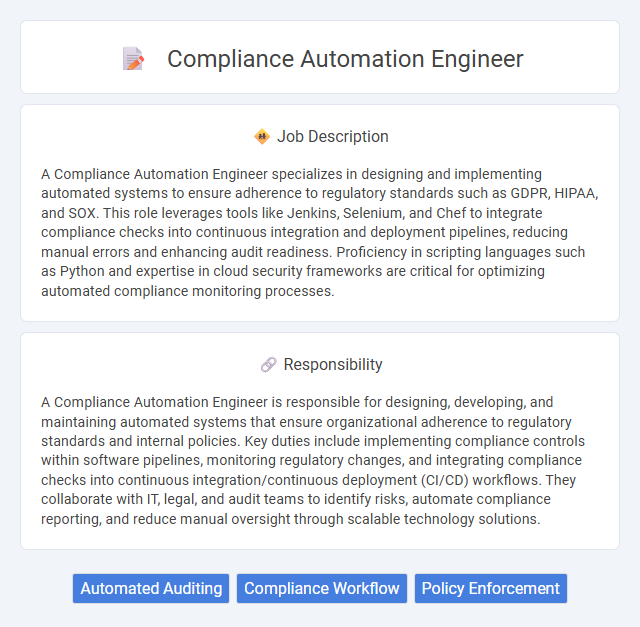
A Compliance Automation Engineer specializes in designing and implementing automated systems to ensure adherence to regulatory standards such as GDPR, HIPAA, and SOX. This role leverages tools like Jenkins, Selenium, and Chef to integrate compliance checks into continuous integration and deployment pipelines, reducing manual errors and enhancing audit readiness. Proficiency in scripting languages such as Python and expertise in cloud security frameworks are critical for optimizing automated compliance monitoring processes.
Individuals with strong analytical skills, attention to detail, and a preference for structured environments may likely find a compliance automation engineer role suitable. Those who enjoy solving complex regulatory challenges through technology and continuous learning might have a higher probability of thriving in this position. People who struggle with rapidly changing compliance requirements or lack interest in coding and automation tools might be less compatible with this job.
Qualification
A Compliance Automation Engineer requires expertise in regulatory standards such as GDPR, HIPAA, or SOX combined with proficiency in automation tools like Jenkins, Ansible, and Selenium. Strong programming skills in Python, Java, or PowerShell are essential to develop and maintain compliance scripts and workflows. Experience with cloud platforms (AWS, Azure) and security frameworks facilitates effective implementation of automated compliance monitoring and reporting systems.
Responsibility
A Compliance Automation Engineer is responsible for designing, developing, and maintaining automated systems that ensure organizational adherence to regulatory standards and internal policies. Key duties include implementing compliance controls within software pipelines, monitoring regulatory changes, and integrating compliance checks into continuous integration/continuous deployment (CI/CD) workflows. They collaborate with IT, legal, and audit teams to identify risks, automate compliance reporting, and reduce manual oversight through scalable technology solutions.
Benefit
Compliance automation engineer roles likely enhance efficiency by automating regulatory checks and reducing manual errors, which can result in faster compliance adherence. They probably improve accuracy in tracking regulatory changes and generating audit reports, minimizing the risk of non-compliance penalties. This position might also facilitate better resource allocation by allowing teams to focus on strategic tasks rather than routine compliance monitoring.
Challenge
Compliance automation engineer roles likely present significant challenges in balancing evolving regulatory requirements with efficient automation processes. These professionals probably face complex scenarios requiring constant updates to automated systems to mitigate compliance risks effectively. Navigating diverse compliance frameworks while ensuring seamless integration into existing workflows may be a persistent, demanding aspect of the role.
Career Advancement
Compliance automation engineers harness advanced technologies to streamline regulatory processes, improving accuracy and efficiency in compliance management. Mastery of programming languages, regulatory frameworks, and automation tools accelerates career growth toward senior roles like Compliance Architect or Automation Project Manager. Continuous skill development and certifications in compliance standards and emerging technologies significantly enhance opportunities for leadership positions in this specialized field.
Key Terms
Automated Auditing
A Compliance Automation Engineer specializes in designing and implementing automated auditing systems to ensure continuous regulatory compliance across IT infrastructure. Leveraging advanced scripting and compliance management tools like Chef InSpec and AWS Config, they enable real-time monitoring and reporting of audit trails. Their expertise reduces manual errors, accelerates audit processes, and enhances overall governance and risk management frameworks.
Compliance Workflow
Compliance automation engineers design and implement compliance workflows to ensure regulatory adherence across business processes, utilizing tools like BPMN and RPA for workflow automation. They develop automated checks, audit trails, and reporting mechanisms that streamline risk management and reduce manual compliance burdens. Expertise in frameworks such as SOX, GDPR, and HIPAA is critical for creating scalable, efficient compliance workflows that adapt to evolving regulatory requirements.
Policy Enforcement
Compliance automation engineers specialize in developing and maintaining automated systems to enforce corporate policies and regulatory requirements, ensuring continuous adherence across IT infrastructures. They design workflows that integrate policy rules into software tools, reducing manual oversight and minimizing compliance risks. Expertise in regulatory frameworks like GDPR, HIPAA, and SOX is critical for creating effective policy enforcement mechanisms within automated platforms.
 kuljobs.com
kuljobs.com